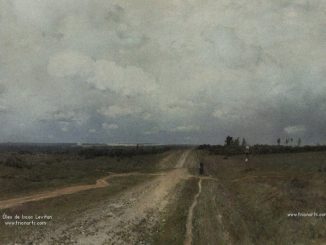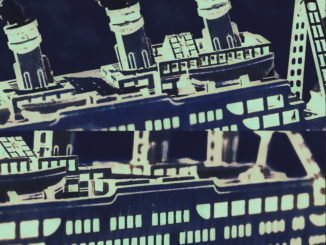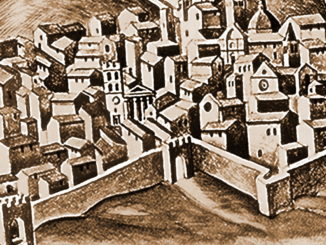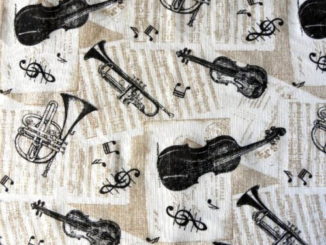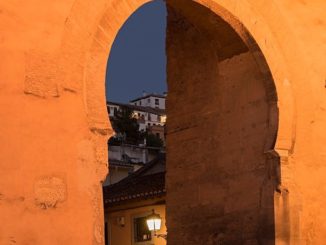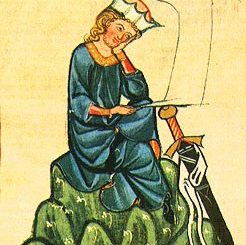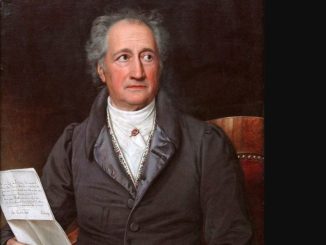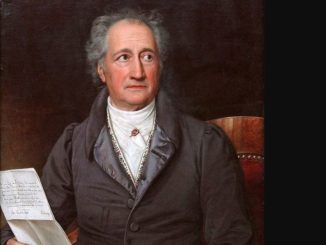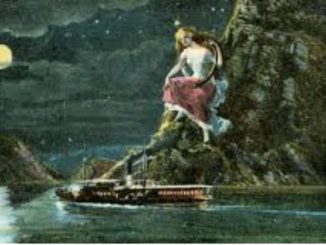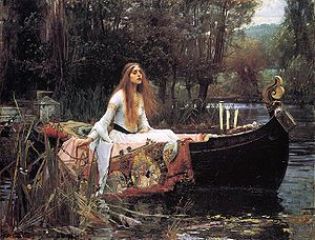
Lord Alfred Tennyson
Lady Shalott balladája
(The Lady of Shalott)
kedves mentoromnak
René Bonnerjea
professzor úrnak
1.
Folyóparton, dús árteren,
Ameddig csak ellát a szem,
Mez?k; hol árpa, s rozs terem,
Rajtuk kis út, s kies helyen:
A soktornyú Camelot.
S a népek látják útjukon;
Sok tavirózsa, liliom,
Egy szigetet, hogy körbefon,
Mit úgy hívnak: Shalott.
2.
Fehér f?zek a szigeten,
Nyárfák reszketnek szelíden,
S dombján – honnan látni heveny-
Hullámún folyóját; igen
Siet, várja Camelot –
Négy szürke fal határolta
Tornyok; s egyik kilátója
Kis lak, partra néz, s lakója
Egy hölgy: Lady Shalott.
3.
F?zek fátylán túl látni ott,
Ár ellen lóval vontatott
Nehéz dereglyét, s csónakot;
Épp selyemvitorlára bont,
S siklik, célja Camelot.
De látni ?t magát? Kezét,
Hogy integet, vagy szerteszét
Néz tornyából – hisz köztük élt
A hölgy; Lady Shalott.
4.
Csak a napszámos, ki korán
Árpát arat – hallja talán
Folyóparton, kanyar után
A dalt, mely visszhangzik falán –
Ott tornyosul Camelot –
S ha még holdfénynél is fárad,
Kévét tornyoz, sosem lázad:
„Ez ?! – szól, s örvend dalának –
Hölgyünk, Lady Shalott!”
5.
Nem látták – munkába merül,
Sz?ttest sz? rendületlenül,
Beszélik, sorsán átok ül,
S lesújt, ha egyszer úgy kerül:
Kinéz – s látvány: Camelot.
Nem tudta, mert nem tudhatta,
Mi végre ez átok rajta?
Csak sz?tt, mivel dolgos fajta
E hölgy, Lady Shalott.
6.
Falára függesztett tükröt
Nézett, s minden abban fürdött,
Árny-bábokat, ember-trükköt,
Országutat, épp ott öltött
Kanyart, s rögtön Camelot;
Folyóján rándító limány,
Parasztok, bugris mindahány,
S pár r?t kötény? árus lány;
S mögöttük már Shalott.
7.
Juhászlegény a nap során,
Apát poroszkál hátasán,
Leánycsapat, cserfes, vidám,
S apród, karmazsin vért-vasán
Tükröz?dik Camelot.
S olykor, tükör kékjén által,
Egy-egy lovag halad, s rá vall:
Egy sem ékes szalagjával;
S névvel: Lady Shalott.
8.
S mi b?t a kristály tükrözött,
Szövétnekébe költözött;
Hol gyászmenet, nap, s éj között,
Fáklyás, toll-díszbe öltözött;
S gyász-zenét hall Camelot;
Avagy fennjáró hold alatt,
J? éji nászra két alak.
„Úgy unom már az árnyakat!”
Szólott Lady Shalott.
9.
S hol kéve gy?lt – egy szép napon,
Nyíllövés-túlnyi távolon,
Lomb közt, hol fény matat vakon,
Vért csillan, ím, egy lovason.
A h?s, Sir Lancelot.
Lovag, keresztes nagy vitéz,
Borulni térdre egyre kész;
Lakjék a hölgy még oly penész
Helyen is, mint Shalott.
10.
Mint csillagöv függ az égen,
Kantárja b?, csüng ledéren,
Csengetty? rajt’, cseng? érem,
Páncélja peng; talpig vértben
Üget, célja Camelot.
Vállszíja címeres b?r viselet,
Övén ezüst kürt díszeleg,
Cseng-bongva léptetett; ilyet
Nem látott még Shalott.
11.
Ég kékje mély, felh? se szállt,
Nyergét rubint-sor sz?tte át;
Sok vércseppként izzó szilánk,
Sisakja-tolla egybe-láng.
Léptet, s közel Camelot.
Akár, ha bíbor éj vörös
Tüzét, ha szítja üstökös,
Szakállas-csóvás, s e ködös
R?t fényben áll Shalott.
12.
Vörösl? fény szemöldökén,
Fényes patájú csatamén
Alatta; fürtje hosszú, szén-
Szín; leng lobogva, léptetvén;
S el?tte, ím: Camelot.
Trillája zeng?, s messze fent,
Kristálytükörben, átellent,
Akár a végzet, megjelent
A h?s Sir Lancelot.
13.
Eldobva sz?ttes, hagyva szék,
Ablakhoz hármat szökkenék,
Vízpartra vetni szép szemét,
Tollas sisakot látni lép,
S bámul: alant Camelot.
S szövése foszlott perc alatt,
A kristálytükör meghasadt,
„Átkom lesújt!” – így felrivallt
A hölgy, Lady Shalott.
14.
Kelet fel?l vihar támadt,
Feszültek fák, bújt az állat,
Folyó rítt, s bömbölt imákat;
Rájuk szakadt égi bánat;
Ázott tornyos Camelot.
Honát hagyván lelt egy sajkát,
Mit f?zfák közt öböl dajkált,
Reá gyorsan nevet pingált,
Azt, hogy „Lady Shalott”.
15.
Homályos árnyak, partfalak,
Folyóba néz a h?s lovag,
Transzállapotba tért alak,
Balsorsát látja álmatag;
Egy asszony, s nem Camelot.
S j? ádáz nap rút estele,
Lánc oldva, ár lódul vele,
Led?lve sajka mélyibe
A hölgy, Lady Shalott.
16.
Nyugodtan fekszik ott, fehér
Kend?je b?, cibálja szél,
Mint vég-palást, hull rá levél,
Kit már csak éji nesz kísér;
Végs? útja: Camelot.
S hogy csónak orra széliránt,
Dombok között, s mez?kön át,
Hallhatta mind: hattyúdalát
Zengte Lady Shalott.
17.
S hogy száll a jámbor, meghatott
Sirám, s hirdet alázatot;
A vére lassan megfagyott,
S szemét egy árny lezárta ott,
Leért, ahol Camelot.
S elébb, mint nyüzsg? ár heve,
Házak közé ért volna le;
Kifúlt a dal, s meghalt vele
A hölgy: Lady Shalott.
18.
Virágtól díszl? kertfalak,
Erkélyek, s tornyos tér alatt,
Elérte ott a házakat
E némán sikló rém-alak;
Ünnepelt épp Camelot.
S mind-mind a mólóhoz gy?lnek,
Lovag, polgár, urak, hölgyek,
S egyként egy nevet bet?znek,
Azt, hogy „Lady Shalott”.
19.
„Ki volna ?? S miért van itt?” –
Egy fényes házból kérdezik,
S pazar vidámság megszegik;
Keresztet vetvén mindegyik
Lovag; s búsul Camelot.
„Mi bájos! – vélte Lancelot –
Ez arcnak mennyi kecs jutott,
Nyilván Isten kegyeltje volt
E hölgy: Lady Shalott”.
On either side the river lie
Long fields of barley and of rye,
That clothe the wold and meet the sky;
And thro' the field the road runs by
To many-tower'd Camelot;
And up and down the people go,
Gazing where the lilies blow
Round an island there below,
The island of Shalott. [1]
Willows whiten, aspens quiver, [2]
Little breezes dusk and shiver
Thro' the wave that runs for ever
By the island in the river
Flowing down to Camelot.
Four gray walls, and four gray towers,
Overlook a space of flowers,
And the silent isle imbowers
The Lady of Shalott.
By the margin, willow-veil'd
Slide the heavy barges trail'd
By slow horses; and unhail'd
The shallop flitteth silken-sail'd
Skimming down to Camelot:
But who hath seen her wave her hand?
Or at the casement seen her stand?
Or is she known in all the land,
The Lady of Shalott? [3]
Only reapers, reaping early
In among the bearded barley,
Hear a song that echoes cheerly
From the river winding clearly,
Down to tower'd Camelot:
And by the moon the reaper weary,
Piling sheaves in uplands airy,
Listening, whispers "'Tis the fairy
Lady of Shalott". [4]
PART II
There she weaves by night and day
A magic web with colours gay.
She has heard a whisper say,
A curse is on her if she stay [5]
To look down to Camelot.
She knows not what the 'curse' may be,
And so [6] she weaveth steadily,
And little other care hath she,
The Lady of Shalott.
And moving thro' a mirror clear
That hangs before her all the year,
Shadows of the world appear.
There she sees the highway near
Winding down to Camelot:
There the river eddy whirls,
And there the surly village-churls, [7]
And the red cloaks of market girls,
Pass onward from Shalott.
Sometimes a troop of damsels glad,
An abbot on an ambling pad,
Sometimes a curly shepherd-lad,
Or long-hair'd page in crimson clad,
Goes by to tower'd Camelot;
And sometimes thro' the mirror blue
The knights come riding two and two:
She hath no loyal knight and true,
The Lady of Shalott.
But in her web she still delights
To weave the mirror's magic sights,
For often thro' the silent nights
A funeral, with plumes and lights,
And music, went to Camelot: [8]
Or when the moon was overhead,
Came two young lovers lately wed;
"I am half-sick of shadows," said
The Lady of Shalott. [9]
PART III
A bow-shot from her bower-eaves,
He rode between the barley sheaves,
The sun came dazzling thro' the leaves,
And flamed upon the brazen greaves
Of bold Sir Lancelot.
A redcross knight for ever kneel'd
To a lady in his shield,
That sparkled on the yellow field,
Beside remote Shalott.
The gemmy bridle glitter'd free,
Like to some branch of stars we see
Hung in the golden Galaxy. [10]
The bridle bells rang merrily
As he rode down to [11] Camelot:
And from his blazon'd baldric slung
A mighty silver bugle hung,
And as he rode his armour rung,
Beside remote Shalott.
All in the blue unclouded weather
Thick-jewell'd shone the saddle-leather,
The helmet and the helmet-feather
Burn'd like one burning flame together,
As he rode down to Camelot. [12]
As often thro' the purple night,
Below the starry clusters bright,
Some bearded meteor, trailing light,
Moves over still Shalott. [13]
His broad clear brow in sunlight glow'd;
On burnish'd hooves his war-horse trode;
From underneath his helmet flow'd
His coal-black curls as on he rode,
As he rode down to Camelot. [14]
From the bank and from the river
He flashed into the crystal mirror,
"Tirra lirra," by the river [15]
Sang Sir Lancelot.
She left the web, she left the loom;
She made three paces thro' the room,
She saw the water-lily [16] bloom,
She saw the helmet and the plume,
She look'd down to Camelot.
Out flew the web and floated wide;
The mirror crack'd from side to side;
"The curse is come upon me," cried
The Lady of Shalott.
PART IV
In the stormy east-wind straining,
The pale yellow woods were waning,
The broad stream in his banks complaining,
Heavily the low sky raining
Over tower'd Camelot;
Down she came and found a boat
Beneath a willow left afloat,
And round about the prow she wrote
'The Lady of Shalott.' [17]
And down the river's dim expanse--
Like some bold seër in a trance,
Seeing all his own mischance--
With a glassy countenance
Did she look to Camelot.
And at the closing of the day
She loosed the chain, and down she lay;
The broad stream bore her far away,
The Lady of Shalott.
Lying, robed in snowy white
That loosely flew to left and right--
The leaves upon her falling light--
Thro' the noises of the night
She floated down to Camelot;
And as the boat-head wound along
The willowy hills and fields among,
They heard her singing her last song,
The Lady of Shalott. [18]
Heard a carol, mournful, holy,
Chanted loudly, chanted lowly,
Till her blood was frozen slowly,
And her eyes were darken'd wholly, [19]
Turn'd to tower'd Camelot;
For ere she reach'd upon the tide
The first house by the water-side,
Singing in her song she died,
The Lady of Shalott.
Under tower and balcony,
By garden-wall and gallery,
A gleaming shape she floated by,
Dead-pale [20] between the houses high,
Silent into Camelot.
Out upon the wharfs they came,
Knight and burgher, lord and dame,
And round the prow they read her name,
'The Lady of Shalott' [21]
Who is this? and what is here?
And in the lighted palace near
Died the sound of royal cheer;
And they cross'd themselves for fear,
All the knights at Camelot:
But Lancelot [22] mused a little space;
He said, "She has a lovely face;
God in his mercy lend her grace,
The Lady of Shalott". [23]
Legutóbbi módosítás: 2019.07.09. @ 15:17 :: Rossner Roberto


